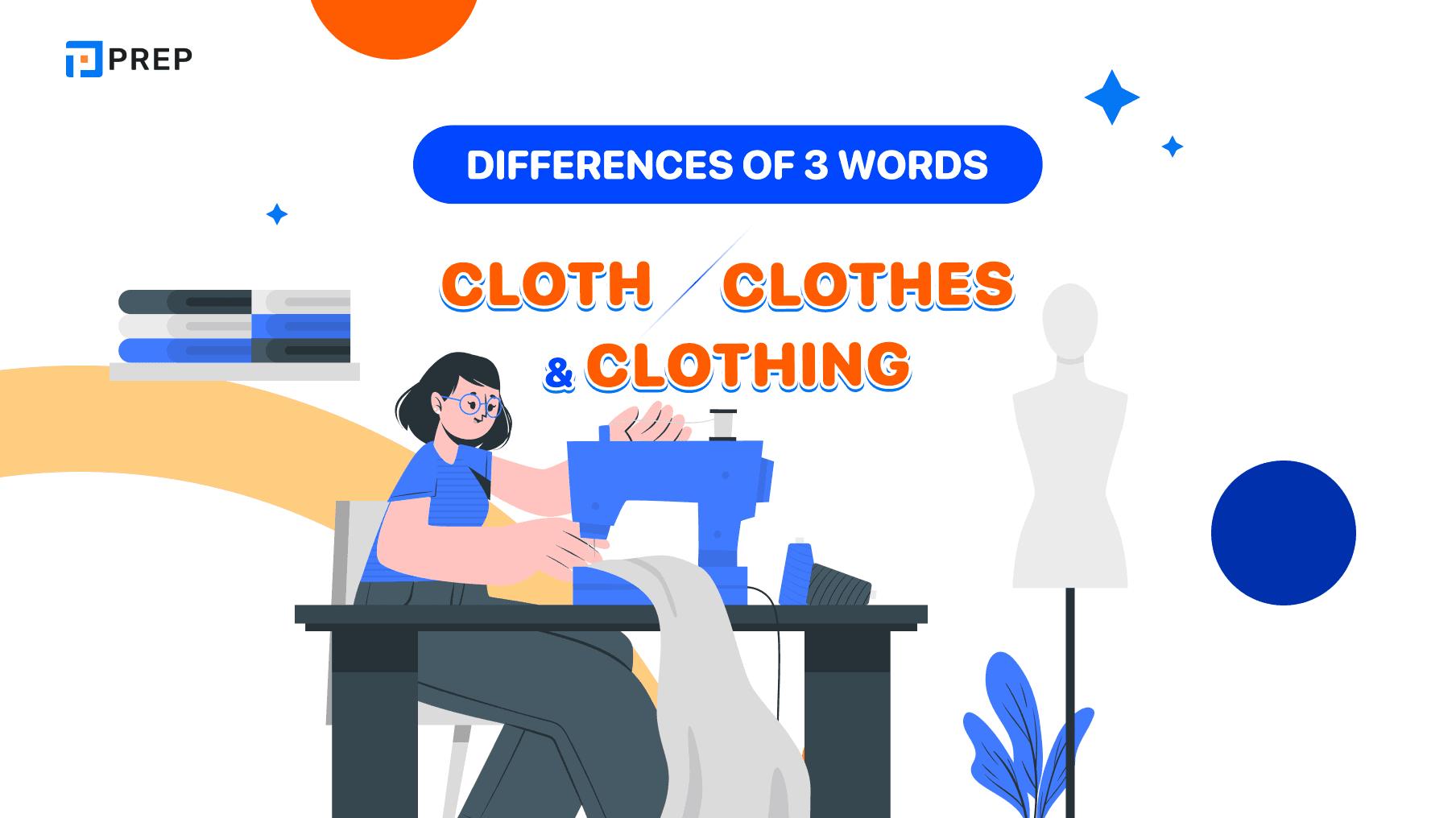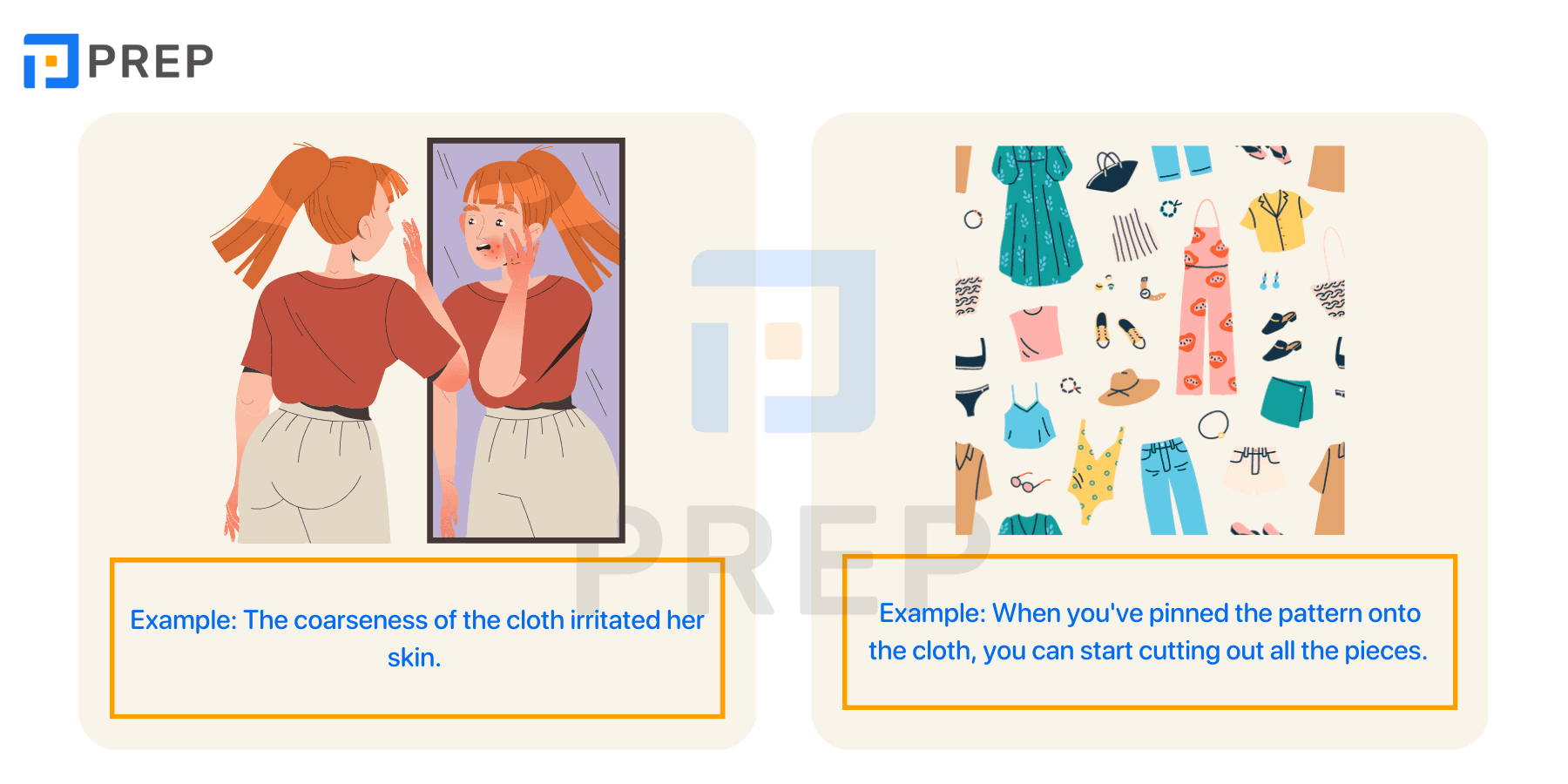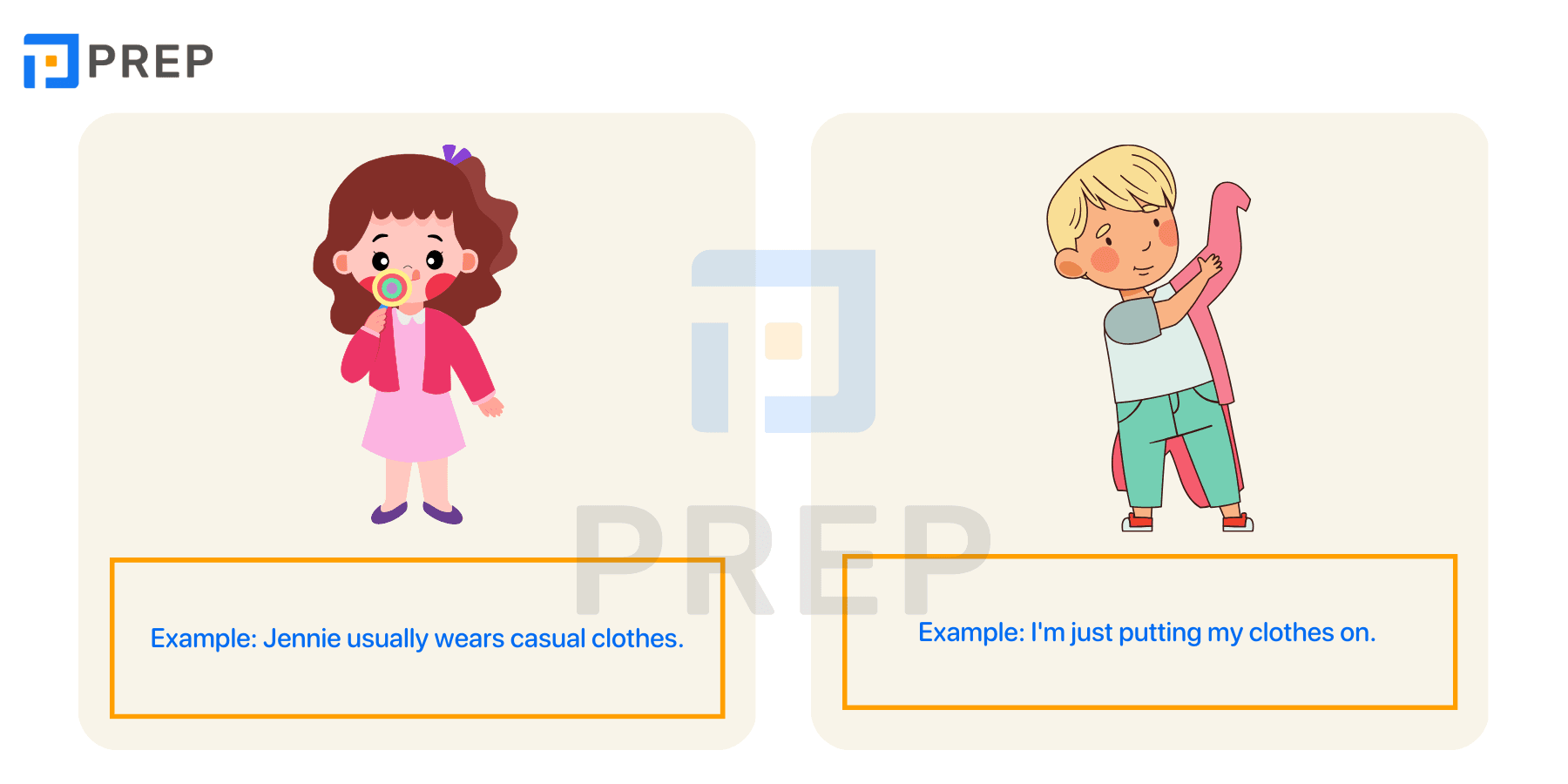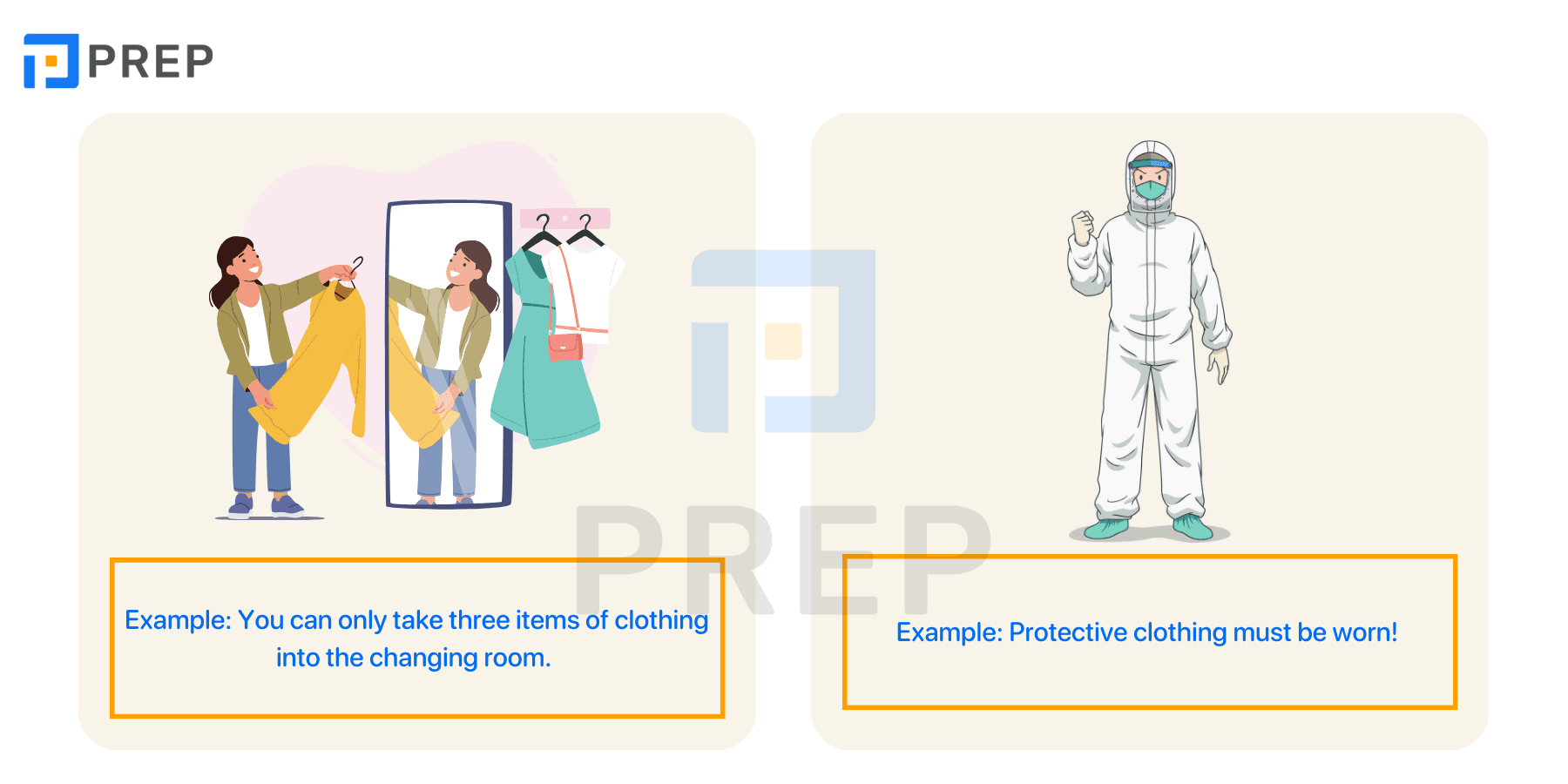What are Cloth, Clothes and Clothing in English? Do they have the same meaning?
What are Cloth, Clothes and Clothing? Do these three words have the same meaning? This is a question that many are curious about in the usage of Cloth, Clothes and Clothing. In today's article, PREP will explain all the related knowledge so that you know how to distinguish these three words accurately!

I. What is Cloth?
What is Cloth? According to the Cambridge dictionary, Cloth is pronounced as /klɑːθ/, this word functions as a noun, meaning: material made by weaving cotton, wool, or other fibers, or a piece of such material. For example:
- The coarseness of the cloth irritated her skin.
- When you've pinned the pattern onto the cloth, you can start cutting out all the pieces.

II. What is Clothes?
What is Clothes? According to the Cambridge dictionary, Clothes is pronounced as /kloʊðz/, this word serves as a noun, meaning: things such as dresses and trousers that you wear to cover, protect, or decorate your body. For example:
- Jennie usually wears casual clothes.
- I'm just putting my clothes on.

Let’s learn some words and phrases that are often associated with Clothes!
|
Words/ phrases associated with Clothes |
Meaning |
Example |
|
Casual clothes |
Casual clothes are not formal or not suitable for special occasions |
On the weekends, Jenny prefers wearing casual clothes like jeans and T-shirts for a relaxed look. |
|
Smart clothes |
Smart clothes are for special events or formal occasions |
For the job interview, Alex chose smart clothes, including a tailored suit and a crisp dress shirt. |
|
Civilian clothes |
Everyday or ordinary clothing, as distinguished from a military uniform |
After years in the military, Peter was relieved to return to civilian clothes and leave the uniform behind. |
|
Clothes dryer |
A machine that dries wet clothes by turning them in hot air |
The clothes dryer quickly dries the wet clothes. |
III. What is Clothing?
What is Clothing? According to the Cambridge Dictionary, Clothing is pronounced as /ˈkloʊ.ðɪŋ/, this word functions as a noun, meaning: clothes of a particular type, especially of a type made to protect the wearer against cold, heat, water, or machinery. For example:
- You can only take three items of clothing into the changing room.
- Protective clothing must be worn!

Let’s learn some words and phrases that are often associated with Clothing!
|
Words/phrases associated with Clothing |
Meaning |
Example |
|
A piece/item/article of clothing |
Marry bought a beautiful piece of clothing - a flowing dress with intricate patterns. |
|
|
Protective clothing |
special clothes that are worn to protect the body |
Firefighters wear protective clothing to shield themselves from heat and flames during rescue operations. |
|
On clothing |
The stain on Anna’s clothing was so stubborn that it required special detergent to remove. |
|
|
A wolf in sheep’s clothing (Idiom) |
a person with a pleasant and friendly appearance that hides the fact that they are evil |
Robert appeared friendly, but he was a wolf in sheep's clothing, pretending to be nice while harboring malicious intentions. |
IV. The differences between Cloth, Clothes and Clothing
So what are the differences between Cloth, Clothes and Clothing? Let's learn about them together in the table below:
|
Distinguish |
Cloth |
Clothes |
Clothing |
|
Part of speech |
Uncountable noun. |
Plural noun. |
Uncountable noun. |
|
Pronunciation |
/klɒθ/ |
/kləʊðz/ |
/ˈkləʊðɪŋ/ |
|
Meaning |
material made by weaving cotton, wool, or other fibers, or a piece of such material |
things such as dresses and trousers that you wear to cover, protect, or decorate your body |
clothes of a particular type, especially of a type made to protect the wearer against cold, heat, water, or machinery |
|
Example |
My brother prefers using cotton cloth to sew clothes. |
My brother takes off all his clothes after work. |
My brother has to wear protective clothing when he is at work. |
V. Exercises to differentiate Cloth, Clothes and Clothing
To clearly distinguish the usage of Cloth, Clothes and Clothing, let's complete the two exercises below together!
1. Exercises
Exercise 1: Choose the correct answer: Cloth, Clothes and Clothing
- Harry used a soft _______ to wipe the dust off the antique furniture.
- Clothes
- Clothing
- Cloth
- The tailor selected a high-quality _______ to make the custom suit.
- Clothes
- Clothing
- Cloth
- She packed her _______ for the weekend trip, including jeans, shirts, and a cozy sweater.
- Clothes
- Clothing
- Cloth
- Proper protective _______ is essential when working in a chemical laboratory.
- Clothes
- Clothing
- Cloth
- While shopping, she picked out a beautiful piece of cloth to make _______ for her daughter.
- Clothes
- Clothing
- Cloth
Exercise 2: Find and correct mistakes
- A delicate clothing covered the table for an elegant dinner setting.
- After swimming, we changed into dry cloth before heading to the cafe.
- His closet was full of cloth in various colors and styles.
- She donated bags of cloths to the local charity for those in need.
- The store offers a wide selection of cloth items, from formal wear to casual outfits.
2. Answer
Exercise 1:
- C
- C
- A
- B
- A
Exercise 2:
- clothing ➞ cloth
- cloth ➞ clothes
- cloth ➞ clothes
- cloths ➞ clothes
- cloth ➞ clothing
VI. From Beginner to Band 7+
PREP hopes that the article above has helped you understand the concepts, usage, and differences between Cloth, Clothes and Clothing. If you’re ready to claim your high band score, PREP’s proven strategies will guide you to success
- IELTS course: Score Big in IELTS With Our Expert Tips!

Hi I'm Chloe, and I am currently serving as an Product Content Administrator at Prep Education. With over five years of experience in independent online IELTS study and exam preparation, I am confident in my ability to support learners in achieving their highest possible scores.
Comment
Premium content
View allPersonalized roadmap
Most read












